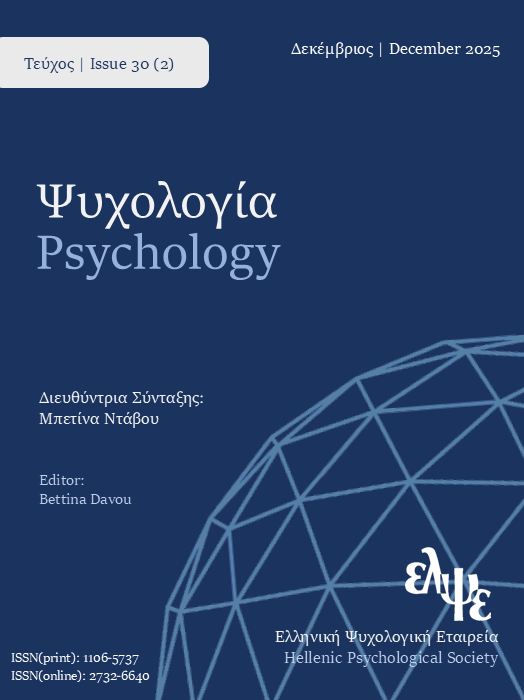Αγαπώντας την παροδικότητα της ζωής: Πώς η υπαρξιακή ευγνωμοσύνη ωθεί τη μετατραυματική ανάπτυξη σε επιζήσαντες καρκίνου

Περίληψη
Η επιβίωση από τον καρκίνο συνοδεύεται συχνά από υπαρξιακή οδύνη, καθώς τα άτομα έρχονται αντιμέτωπα με τη θνητότητα και αναζητούν το νόημα σε αυτό που βιώνουν. Η παρούσα μελέτη διερευνά την υπαρξιακή ευγνωμοσύνη, μια ενισχυμένη αίσθηση εκτίμησης της ζωής που αναδύεται μέσα από τον πόνο και την επίγνωση της παροδικότητας, ως διαμεσολαβητική μεταβλητή μεταξύ πνευματικότητας και μετατραυματικής ανάπτυξης (ΜΑ) σε Ινδούς επιζήσαντες καρκίνου. Βασισμένη στη Θεωρία Διαχείρισης του Τρόμου (Terror Management Theory, TMT), η έρευνα εξετάζει κατά πόσο η πνευματικότητα, διαμεσολαβείται από την υπαρξιακή ευγνωμοσύνη. αντί να προάγει άμεσα τη μετατραυματική ανάπτυξη. Το δείγμα αποτέλεσαν 118 Ινδοί και Ινδές που επέζησαν από τον καρκίνο, τουλάχιστον έξι μήνες μετά την ολοκλήρωση της ενεργού θεραπείας. Οι συσχετίσεις Spearman’s rho έδειξαν σημαντικές θετικές σχέσεις μεταξύ υπαρξιακής ευγνωμοσύνης, πνευματικότητας και ΜΑ. Η ανάλυση διαμεσολάβησης έδειξε ότι η υπαρξιακή ευγνωμοσύνη διαμεσολαβεί πλήρως τη σχέση ανάμεσα στην πνευματικότητα και τη μετατραυματική ανάπτυξη (β = 0.161, p = 0.003), ενώ η πνευματικότητα δεν φάνηκε να είχε άμεση επίδραση στη ΜΑ (β = 0.081, p = 0.414) όταν λαμβάνεται υπόψη η υπαρξιακή ευγνωμοσύνη. Τα ευρήματα αμφισβητούν την παραδοσιακή θεώρηση της πνευματικότητας ως εγγενούς κινητήριου παράγοντα ανάπτυξης, υποδεικνύοντας ότι η μετατραυματική ανάπτυξη αναδύεται όταν η υπαρξιακή ευγνωμοσύνη συμβάλει στην μετατροπή της επίγνωσης της θνητότητας σε εκτίμηση της ευθραυστότητας της ζωής.
Λεπτομέρειες άρθρου
- Πώς να δημιουργήσετε Αναφορές
-
Jacob, L., & Sathiyaseelan, A. (2025). Αγαπώντας την παροδικότητα της ζωής: Πώς η υπαρξιακή ευγνωμοσύνη ωθεί τη μετατραυματική ανάπτυξη σε επιζήσαντες καρκίνου. Ψυχολογία: το περιοδικό της Ελληνικής Ψυχολογικής Εταιρείας, 30(2), 57–69. https://doi.org/10.12681/psy_hps.40933
- Ενότητα
- ΕΜΠΕΙΡΙΚΕΣ ΕΡΓΑΣΙΕΣ

Αυτή η εργασία είναι αδειοδοτημένη υπό το Creative Commons Attribution-ShareAlike 4.0 International License.
Το περιοδικό ΨΥΧΟΛΟΓΙΑ έχει υιοθετήσει μία πολιτική Platinum open-access. Τα έξοδα υποβολής, επεξεργασίας ή δημοσίευσης των εργασιών καλύπτονται από την Ελληνική Ψυχολογική Εταιρεία. Τα πνευματικά δικαιώματα των δημοσιευμένων εργασιών προστατεύονται από την άδεια 'Creative Commons Attribution-ShareAlike 4.0 International'. Οι Συγγραφείς διατηρούν τα Πνευματικά Δικαιώματα και χορηγούν στο περιοδικό το δικαίωμα της πρώτης δημοσίευσης. Η άδεια αυτή επιτρέπει σε τρίτους, να χρησιμοποιούν την εργασία σε οποιαδήποτε μορφή, με την προϋπόθεση της διατήρησης των διατυπώσεων που προβλέπονται στην άδεια σχετικά με την αναφορά στον αρχικό δημιουργό και την αρχική δημοσίευση στο περιοδικό ΨΥΧΟΛΟΓΙΑ. Επιπλέον, κάθε διανομή της εργασίας οφείλει να γίνεται με τους ίδιους όρους διανομής, δηλαδή με την ίδια άδεια Creative Commons.


